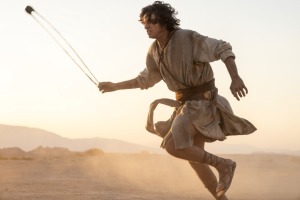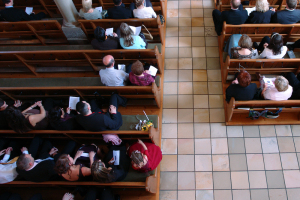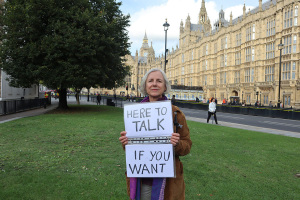Romney Faces Challenge in Battling Perry for Evangelical Support
While GOP candidate Mitt Romney's evangelical support seems stronger than in 2008 when it was his downfall, the strong surge by frontrunner and strong evangelical Rick Perry means Romney still has an uphill battle to capture the GOP primary in 2012.
In 2008 Romney came up short after closing in on the top spot. Divided Christian support left him with 4 million supporters compared to eventual nominee's John McCain's 4.7 million.
However, some polls show that conservative Christians, who have had nearly three years to think, are now slightly supportive of a Mormon in 2012.
Summer polls show that 74 percent of respondents who self-identified as Protestants or other Christians said yes, they would be willing to vote for a Mormon president. Additionally, 80 percent of Republicans also said they would vote for a Mormon presidential candidate.
These numbers are in contrast to a 2007 poll, where 66 percent of conservatives said they would vote for a Mormon presidential candidate.
National polls unveiled Tuesday show the former Massachusetts governor is still a strong competitor for the 2012 Republican presidential nomination, but suddenly in a neck-and-neck race with Perry. Of the Republicans and Republican-leaning independents polled in a Gallup survey released this week, 71 percent said they held a favorable or strongly favorable view of Romney. But the surging Perry now holds either strongly favorable or favorable opinions among 73 percent of Republicans and right-leaning independents. And additionally Perry has a higher positive intensity (strong approval minus strong negative opinions) score (25 percent) among conservatives than Romney (12 percent).
Romney still holds an edge in name recognition over Perry by 88 to 74 percent, according to the poll.
Unlike 2008, Romney's campaign has more public support of some evangelicals, potentially drawing the influential GOP constituency to his side.
Christian bloggers David French and his wife Nancy run a website entitled "Evangelicals for Mitt." The husband and wife duo enlists the help of two of their fellow bloggers to share the "relentless logic" of Romney's candidacy to readers.
The Frenchs write on their website that while "cultural issues are ... central to the life and health of our country, we cannot focus on cultural issues to the exclusion of the very real economic and military challenges we continue to face." The two supported Romney in 2008 and are supporting him again in the 2012 race.
Mark DeMoss, a Southern Baptist and the founder of faith-based public relations firm, The DeMoss Group, supports Romney and also serves as an advisor to his campaign.
He said of his support in 2008 election cycle and now in the 2012 cycle, "I decided that it's more important for me that a candidate shares my values than it is [if] he or she shared my theology."
Even Ralph Reed, founder of the Faith and Freedom Coalition who does not support Romney, told The Washington Times recently: "He is much more likely to have to answer questions about Massachusetts health care now than answer questions about his religious beliefs."
Despite increased support from evangelicals, Romney still has a challenge. Overall, support for a Mormon candidate significantly trails, at 76 percent, national support for a black candidate (94 percent) and a female candidate (93 percent).
For example, Greenville, South Carolina Pastor Stan Craig asserts Romney's Mormon faith is the defining issue. Craig is also uncomfortable with voting for a woman for president, but said if given a choice between Congresswoman Michele Bachmann of Minnesota and Romney, "I probably would cast my vote for Michele."
A recent PRRI poll reveals the majority of Americans say they do not know a lot about the religious beliefs and practices of Mormons. For example, 17 percent of Americans say they know a lot compared to 55 percent that say they know a little, while 27 percent say they know nothing about the religious practices and beliefs of Mormons.
More than 4 in 10 say they do not consider it a Christian religion.
Richard Land of the Southern Baptist Convention's Ethics and Religious Liberty Commission says a candidate's faith should be a concern in an election.
"If [a candidate's] worldview is informed by his faith, I think it is his right and obligation to make it clear to the American people," said Land, who is also executive editor of The Christian Post.
Both Romney and Jon Huntsman, Jr., the other Mormon GOP presidential candidate, are playing up the similarities between the Mormon and Christian faiths in order to reach evangelicals.
Huntsman, who continues to trail behind many of the GOP candidates, also emphasized his belief in God in an interview with CNN's Piers Morgan.
Romney said of his faith in his 2007 speech, "I believe that Jesus Christ is the Son of God and the Savior of mankind ... My church's beliefs about Christ may not all be the same as those of other faiths. Each religion has its own unique doctrines and history."
Mormonism, rooted in the doctrines taught by Joseph Smith in the early 1800s, follows the teaching of The Book of Mormon in addition to the Bible. But most evangelicals discount the prophecy of Mormon found Joseph Smith and The Book of Mormon.





























